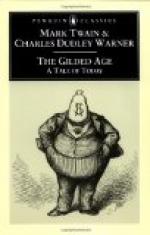To his uncle he said that he had made an arrangement with some New York capitalists to go to Missouri, in a land and railroad operation, which would at least give him a knowledge of the world and not unlikely offer him a business opening. He knew his uncle would be glad to hear that he had at last turned his thoughts to a practical matter.
It was to Ruth Bolton that Philip wrote last. He might never see her again; he went to seek his fortune. He well knew the perils of the frontier, the savage state of society, the lurking Indians and the dangers of fever. But there was no real danger to a person who took care of himself. Might he write to her often and, tell her of his life. If he returned with a fortune, perhaps and perhaps. If he was unsuccessful, or if he never returned—perhaps it would be as well. No time or distance, however, would ever lessen his interest in her. He would say good-night, but not good-bye.
In the soft beginning of a Spring morning, long before New York had breakfasted, while yet the air of expectation hung about the wharves of the metropolis, our young adventurers made their way to the Jersey City railway station of the Erie road, to begin the long, swinging, crooked journey, over what a writer of a former day called a causeway of cracked rails and cows, to the West.
CHAPTER XIII.
What
ever to say be toke in his entente,
his
langage was so fayer & pertynante,
yt
semeth unto manys herying not only the worde,
but
veryly the thyng.
Caxton’s
Book of Curtesye.
In the party of which our travelers found themselves members, was Duff Brown, the great railroad contractor, and subsequently a well-known member of Congress; a bluff, jovial Bost’n man, thick-set, close shaven, with a heavy jaw and a low forehead—a very pleasant man if you were not in his way. He had government contracts also, custom houses and dry docks, from Portland to New Orleans, and managed to get out of congress, in appropriations, about weight for weight of gold for the stone furnished.
Associated with him, and also of this party, was Rodney Schaick, a sleek New York broker, a man as prominent in the church as in the stock exchange, dainty in his dress, smooth of speech, the necessary complement of Duff Brown in any enterprise that needed assurance and adroitness.
It would be difficult to find a pleasanter traveling party one that shook off more readily the artificial restraints of Puritanic strictness, and took the world with good-natured allowance. Money was plenty for every attainable luxury, and there seemed to be no doubt that its supply would continue, and that fortunes were about to be made without a great deal of toil. Even Philip soon caught the prevailing spirit; Barry did not need any inoculation, he always talked in six figures. It was as natural for the dear boy to be rich as it is for most people to be poor.




